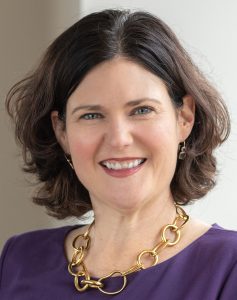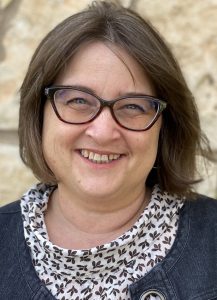A new curriculum under consideration by the Texas Education Agency threatens to turn state schools into Sunday schools and violate the religious freedom rights of children and families, education and religious liberty advocates warned during a recent webinar.
The Bible-based learning curriculum presents religious themes as vehicles for teaching reading and language arts to K-5 students, while it actually uses academic learning as cover for instructing students in the Christian faith, said Amanda Tyler, executive director of Baptist Joint Committee for Religious Liberty and lead organizer of Christians Against Christian Nationalism.

Amanda Tyler
“Children and their families have the right to go to public schools without worrying that the public schools will be teaching religion as opposed to teaching about religion,” Tyler said during the webinar hosted by Texas Impact, BJC and Christians Against Christian Nationalism.
The event was designed to alert education and religious freedom advocates about the curriculum promoted by Christian conservatives and about the timeline for its consideration by TEA and, if approved, by the State Board of Education and individual school districts.
The curriculum frequently drills into biblical events and personalities, including the parable of the Prodigal Son, the Sermon on the Mount and Jesus’ Crucifixion and Resurrection. Queen Esther is presented as a historical figure alongside Martin Luther King Jr. and Cesar Chavez, while the Golden Rule is presented as a uniquely Christian concept rather than a principle embodied in many faiths.
“We have this persistent and often gratuitous recitation and reading of Scripture as part of several of these lessons for kids as young as 5 years old (and) Bible stories in many of these cases are not at all pertinent to the lessons or the learning objectives,” Tyler said. “There is an entire lesson on King Solomon, and it teaches the Bible story as straightforward fact without using objective language.”
The educators’ guide for that lesson also directs teachers to point out that King David “was an honest and loyal ruler … whom God called ‘a man after my own heart.’ Because King David was faithful to God, God promised him a special gift: a son named Solomon, who God said would one day become a great king.”
Some historical events are interpreted through a biblical perspective without any effort to use objective language or background, Tyler said. One claims Abraham Lincoln and other 19th-century abolitionists were guided by an abiding Christian faith in seeking to end slavery.
“Again, I think one could make an argument that this is not entirely historically accurate,” she said. “On one hand, it’s rather simplistic, but it also feels gratuitous to mention ‘deep Christian faith’ here as if that was the only driver for abolitionists or even for President Lincoln.”
“When Jewish texts are taught, they are taught from a Christian perspective of the Old Testament.”
Meanwhile, the curriculum barely tips its hat to Judaism and Islam while offering virtually no references at all to Hinduism, Buddhism and other traditions, Tyler said. “When Jewish texts are taught, they are taught from a Christian perspective of the Old Testament and in some places we also find when ancient religions are discussed, they are often qualified with the term ‘mythical.’”
During a question-and-answer session, a webinar viewer asked if the curriculum is connected to Project 2025, the conservative blueprint for dismantling democracy in the hoped-for next presidency of Donald Trump.

Bee Morehead
“I don’t know if I would say it’s part of Project 2025 per se, but it’s definitely part of an overarching agenda,” said Bee Moorhead, executive director of Texas Impact. “We have heard from colleagues in other states that they’re getting hit with this exact same thing.”
The Texas Legislature got the ball rolling with a law requiring the agency to develop a curriculum, Moorhead said. “The TEA has been working on this assignment for a while, and most of the people they have heard [from] have been religious conservatives who said it wasn’t religious enough. So, there’s already clearly tension.”
But there will be plenty of opportunities for public education and religious freedom supporters to advocate against the curriculum, beginning with a TEA public comment period that ends Aug. 16, Tyler said.
“This is leading up to a public hearing in Austin that starts on Sept. 10. We will be helping people who are interested in going to Austin and providing some public testimony to the State Board of Education. The State Board of Education will vote on whether to adopt or amend this curriculum in November.”
If the board OK’s the curriculum, it would then be up to individual school districts to adopt the plan, she added, with the goal being to press TEA to take the biblical language out of the curriculum altogether or, failing that, to infuse objectivity and religious diversity into the materials, Tyler said.
“This is a great opportunity for lots of groups and our members who are engaged in a lot of different religious-freedom activities to come together and do something collaborative,” Moorhead said.


